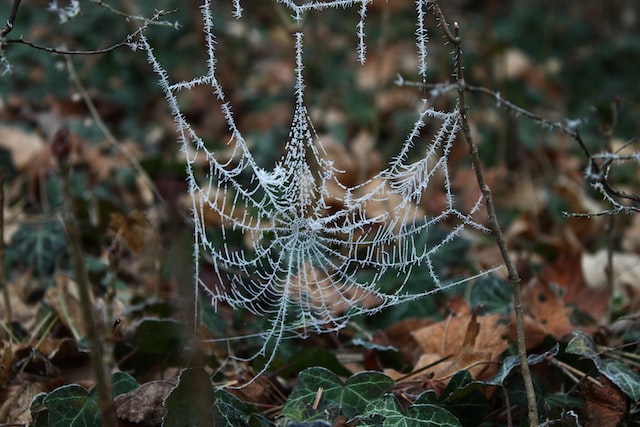Whether creeping around your basement or creating large cobwebs on windowsills, spiders are a common fixture in our homes. In North Carolina, many species may sneak indoors throughout the year, seeking shelter and food.
Of all the seasons, most homeowners tend to notice more spiders in winter months, but do spiders really come inside when the weather outside is frightful?
Take a look at our blog, where we’ll explain the truth about spiders and wintertime weather. Bundle up!
Can Spiders Survive in the Winter?
Some spiders can survive in desert-like environments, while others persist in snowy tundra areas. Arctic wolf spiders and other cold-weather insects can withstand and adapt to the sometimes negative temperatures.
During cold weather, most spiders enter a relatively immobile state, conserving their energy and protecting them against the elements. Some spiders have compounds in their blood that aids against freezing, similar to how antifreeze works for your car!
During this stasis, a spider’s metabolism slows, reducing its need for food. Because wintertime also yields fewer pests for spiders to hunt and eat, they save energy and remain warm despite the chill.
Spiders will burrow down into the ground or find shelter in warm, protected areas to further shield them from the winter weather. They may hide in brush piles, tree limbs, sheds, or homes to escape especially freezing temperatures.
It’s not unusual to see spiders in winter, but they’re not likely to invade your home when the weather turns nippy. Because of these adaptations to the cold, spiders can survive outside of traditional shelters and persist until the spring.
Still Seeing Wintertime Spiders? There’s a Reason!
So, we may not have you fully convinced that spiders don’t habitually infest your home during cold snaps. You may have even seen a few creepy crawling pests patrolling your halls or resting on a web.
It’s true spiders don’t disproportionately infest homes during the winter months. You can have a spider infestation no matter the time of year. However, some spiders stick around year-round and may have always existed indoors.
Meet the house spider! As their name suggests, house spiders primarily reside in commercial buildings or residential homes, relying on humans to survive.
House spiders can include several species, like the American House Spider, the Daddy-Long-Legs Spider, the Common Cellar Spider, the Yellow Sac Spider, and the Hobo Spider.
In Raleigh, residents usually struggle with brown recluse spiders, black widow spiders, and wolf spiders, but many of the aforementioned pests can quickly infest your home. Check out this helpful spider identification guide to learn more about pests you may see around your home!
Plus, any wintertime spiders could be the result of a previous mating. Spiders can mate in any season, including winter, although the timing can vary depending on the species and the conditions. Some spider species have specific mating seasons, while others mate year-round.
Food availability, temperature, and light levels can also impact when and how often spiders mate. In general, spiders tend to be more active during the warmer months, when more insects are available to feed on. However, some species of spiders can continue to mate and lay eggs throughout the winter in suitable conditions.
Seeing spiders in winter months isn’t a cause for concern. Most of the pests you find indoors have probably lived in your home for longer than you think! But spiders shouldn’t become a familiar presence in your home.
No one enjoys a pes-infested space, and most spider species are venomous. While some bites aren’t medically significant, large hoards of spiders could entice other more dangerous species to creep around too.
Spiders in Winter: Control & Prevention
Whether dealing with spiders in winter or a seasonal problem, spider infestations are troublesome and potentially dangerous. Fortunately, you can try several preventative measures to reduce the likelihood of a spider infestation.

Unless you have a house spider problem, these pests can enter your home from the outdoors through exterior cracks or gaps in doors, windows, or walls. Use weather stripping or caulk to seal these areas and prevent spiders from getting in.
Once indoors, spiders can quickly multiply and thrive on their hidden webs. Regularly remove spider webs around your home, especially in corners and near windows. With the spider webs gone, you can avoid a budding infestation.
To further reduce the chances of spiders sticking around, try reducing any cluttered spaces near areas spiders could frequent. Spiders like to hide in dark, disorganized areas, so keeping your home free of clutter can help lessen the number of spiders in your space.
Cleaning can also ward off spiders and even help prevent other insect infestations. Regularly vacuuming your home could help remove spider eggs, webs, and crumbs that could tempt other pests.
Plus, if you’re struggling with spiders, there’s a good chance other insects live indoors that keep them well-fed. Consider inspecting your home for signs of other pests and then take the appropriate measures to reduce their populations.
Insect screens on your windows and doors can aid against spiders and keep other insects, like mosquitoes and flies, out of your home. Regularly check the screens for homes and repair them whenever necessary.
Insecticide sprays may seem a popular alternative if you have existing pest problems, but we caution you when using these products. Many pesticide options are effective against common insects, but always follow the labeled instructions to keep yourself safe.
If you have a spider infestation, it’s best to contact a professional pest control company for safe and effective removal. Removing spiders on your own is often challenging, especially if you’re already struggling with another insect issue.
No matter the pest in your home, give Innovative Pest Solutions a call! We can lend a hand against any creepy crawler overtaking your home. Contact us today to learn more about our services and how we can keep you and your family safe against venomous pests like spiders.





